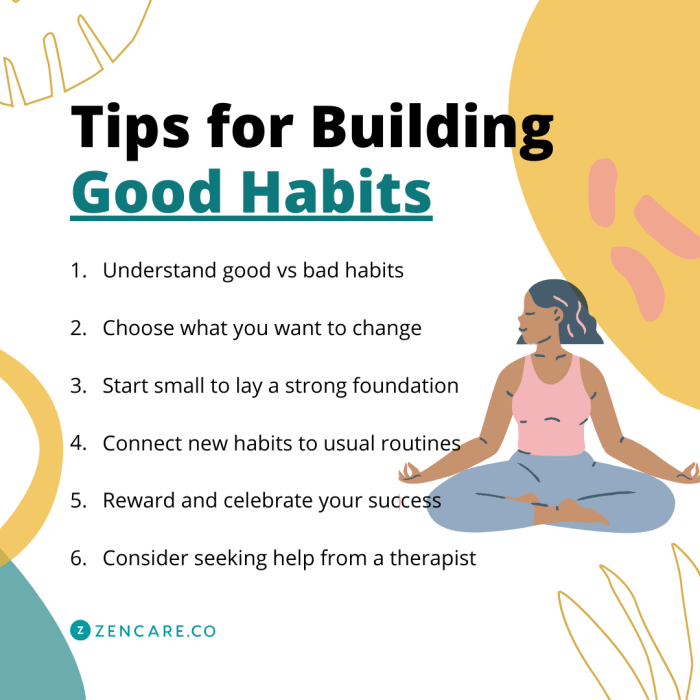Building Healthy Habits sets the foundation for a vibrant and fulfilling life, touching on key strategies and components that lead to overall well-being. Dive into this journey of self-improvement and discover the power of healthy habits in transforming your daily routine.
Benefits of Building Healthy Habits
Building healthy habits is crucial for maintaining overall well-being. By incorporating positive behaviors into our daily routine, we can have a significant impact on both our physical and mental health. Consistency is key in ensuring that these habits become a natural part of our lifestyle, leading to improved productivity and quality of life.
Physical Health
- Regular exercise can improve cardiovascular health, boost immunity, and increase energy levels.
- Eating a balanced diet rich in nutrients can help maintain a healthy weight and reduce the risk of chronic diseases.
- Getting an adequate amount of sleep each night can enhance mood, cognitive function, and overall physical health.
Mental Health
- Practicing mindfulness and stress management techniques can reduce anxiety and improve mental clarity.
- Engaging in hobbies and activities that bring joy can boost mood and overall well-being.
- Seeking social support and maintaining positive relationships can reduce feelings of isolation and improve mental health.
Productivity and Quality of Life
- Healthy habits can increase focus, motivation, and overall productivity in daily tasks.
- Improved physical and mental health can lead to a better quality of life and a greater sense of fulfillment.
- Consistent healthy habits can reduce the risk of burnout and increase resilience in facing challenges.
Strategies for Establishing Healthy Habits
Creating healthy habits involves setting achievable goals, establishing routines, overcoming obstacles, and tracking progress. These strategies are crucial for long-term success in maintaining a healthy lifestyle.
Setting Achievable Goals
Setting specific, measurable, achievable, relevant, and time-bound (SMART) goals is essential for building healthy habits. Start by identifying your objectives and breaking them down into smaller, manageable tasks. For example, if your goal is to exercise more, you can start by committing to a 30-minute workout three times a week.
Importance of Creating a Routine
Establishing a routine helps in solidifying healthy habits. Consistency is key to making these habits stick. Find a time of day that works best for you to exercise, prepare healthy meals, or practice self-care. By incorporating these activities into your daily routine, they become second nature over time.
Tips for Overcoming Obstacles and Staying Motivated
Identify potential obstacles that may hinder your progress and develop strategies to overcome them. Surround yourself with a supportive community, set reminders, and reward yourself for meeting milestones. Stay motivated by focusing on the positive changes you’re making and the benefits of a healthier lifestyle.
Benefits of Tracking Progress and Celebrating Milestones
Tracking your progress allows you to see how far you’ve come and provides motivation to keep going. Celebrate small victories along the way, whether it’s reaching a fitness goal, cooking a nutritious meal, or practicing mindfulness. Recognizing and celebrating these milestones can boost your confidence and reinforce your commitment to building healthy habits.
Components of a Healthy Lifestyle: Building Healthy Habits

Maintaining a healthy lifestyle involves various key components that work together to promote overall well-being. These components include nutrition, exercise, sleep, stress management, social connections, community support, mindset, and attitude.
Nutrition
Proper nutrition is essential for fueling our bodies with the necessary nutrients to function optimally. It involves consuming a balanced diet rich in fruits, vegetables, whole grains, lean proteins, and healthy fats.
Exercise
Regular physical activity is crucial for maintaining a healthy weight, improving cardiovascular health, and boosting overall mood and energy levels. Aim for a mix of cardiovascular exercise, strength training, and flexibility exercises.
Sleep
Quality sleep is vital for overall health and well-being. Aim for 7-9 hours of sleep per night to allow your body to rest and recharge. Poor sleep can lead to a variety of health issues, including fatigue and increased stress levels.
Stress Management
Effective stress management techniques, such as deep breathing, meditation, yoga, or engaging in hobbies, can help reduce the negative impact of stress on both physical and mental health. Finding healthy ways to cope with stress is essential for overall well-being.
Social Connections and Community Support
Building strong social connections and having a supportive community can positively impact mental health and overall well-being. Surrounding yourself with positive influences and a strong support system can help you navigate life’s challenges with resilience.
Mindset and Attitude
Having a positive mindset and attitude towards health and wellness is crucial for adopting and maintaining healthy habits. Cultivating a growth mindset, practicing self-compassion, and setting realistic goals can help you stay motivated and committed to your health journey.
Building Healthy Eating Habits

Eating healthy is essential for overall well-being and longevity. By incorporating nutritious foods into your daily meals, you can boost your energy levels, improve your mood, and reduce the risk of chronic diseases.
Tips for Incorporating More Fruits, Vegetables, and Whole Grains
Eating a variety of fruits, vegetables, and whole grains is key to a balanced diet. Here are some tips to help you incorporate more of these foods into your meals:
- Start your day with a fruit smoothie or a bowl of mixed berries.
- Add leafy greens like spinach or kale to your salads and sandwiches.
- Swap out refined grains for whole grains like quinoa, brown rice, or whole wheat pasta.
Benefits of Meal Planning and Preparation, Building Healthy Habits
Meal planning and preparation can significantly impact your eating habits. By planning your meals ahead of time, you can ensure that you have nutritious options readily available and avoid unhealthy choices when you’re pressed for time.
Strategies for Mindful Eating and Avoiding Emotional Eating
Mindful eating involves paying attention to your food choices and eating habits. By practicing mindful eating, you can become more aware of your hunger cues and make healthier choices. Avoid emotional eating by finding alternative ways to cope with stress or emotions, such as exercise or meditation.
Impact of Hydration and Proper Portion Control
Staying hydrated is crucial for overall health and can help prevent overeating. Drink plenty of water throughout the day and limit sugary beverages. Proper portion control is also essential for maintaining a healthy weight and preventing overeating. Use smaller plates, measure your portions, and listen to your body’s hunger cues.

